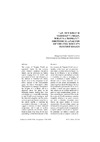Identificador persistente para citar o vincular este elemento:
https://accedacris.ulpgc.es/jspui/handle/10553/57808
| Título: | "Ah, but what is Herself? I mean what is a Woman?": Rhetorical analysis of Virginia Woolf's Feminist Essays | Autores/as: | Sánchez Cuervo, Margarita Esther | Clasificación UNESCO: | 6202 Teoría, análisis y crítica literarias | Palabras clave: | Virginia Woolf Essay Feminism Rhetoric Rhetorical figure, et al. |
Fecha de publicación: | 2010 | Publicación seriada: | ES: Revista de filología inglesa | Resumen: | Los ensayos de Virginia Woolf son conocidos, sobre todo, por su preocupación hacia la condición de la mujer a lo largo de la Historia, y por su reflexión sobre varios aspectos que incluyen la reseña y valoración de obras y personajes, así como la referencia a figuras históricas y literarias más o menos conocidas. En su práctica de este género argumentativo, la autora sigue la estela de Montaigne a la hora de comunicar los pensamientos de un ser en conflicto a través una prosa digresiva, si bien situados en un contexto modernista. A partir de estas consideraciones previas, se hace especialmente interesante la lectura de los ensayos de W oolf teniendo en cuenta las categorías retóricas y las partes orationis que dicta la Retórica, concebida como ciencia que puede analizar el discurso argumentativo. En este trabajo, sugiero una revisión de los componentes retóricos de sus ensayos, y la exploración de los argumentos y figuras retóricas recurrentes en aquellos. En particular, me refiero a ensayos que contienen historias de mujeres inmersas en la visión que la propia Woolf tiene de la Historia. La argumentación retórica permite la revisión de representaciones textuales y su efecto comunicativo, incluyendo las figuras del escritor, el argumento y el lector. The essays of Virginia Woolf are especially known for her concern about women's condition throughout history, and her reflections on various aspects ranging from the review and assessment of works and characters, to the reference to historical and literary figures more or less recognised. In her textual practice of this argumentative genre, she follows Montaigne's influx with regard to his trying to communicate the thoughts of a conflicted self in a digressive prose, but placed in her Modernist context. Starting from these considerations, it is especially interesting to read Woolf's essays bearing in mind the rhetorical categories and the partes orationis given by Rhetoric, conceived as the science capable of analysing the argumentative discourse. In this paper, I suggest a revision of those rhetorical components, and I seek to explore various arguments and rhetorical figures found in some of her texts, for the most part dealing with different histories of the women inhabiting Woolf's particular vision of History. Rhetorical argumentation allows the review of textual representations and their communicative effect, including the figures of writer, argument and reader. |
URI: | https://accedacris.ulpgc.es/handle/10553/57808 | ISSN: | 0210-9689 | Fuente: | ES: Revista de filología inglesa [ISSN 0210-9689], n. 31, p. 263-286 | URL: | http://dialnet.unirioja.es/servlet/articulo?codigo=3353760 |
| Colección: | Artículos |
Visitas
97
actualizado el 06-jul-2024
Descargas
31
actualizado el 06-jul-2024
Google ScholarTM
Verifica
Comparte
Exporta metadatos
Los elementos en ULPGC accedaCRIS están protegidos por derechos de autor con todos los derechos reservados, a menos que se indique lo contrario.
